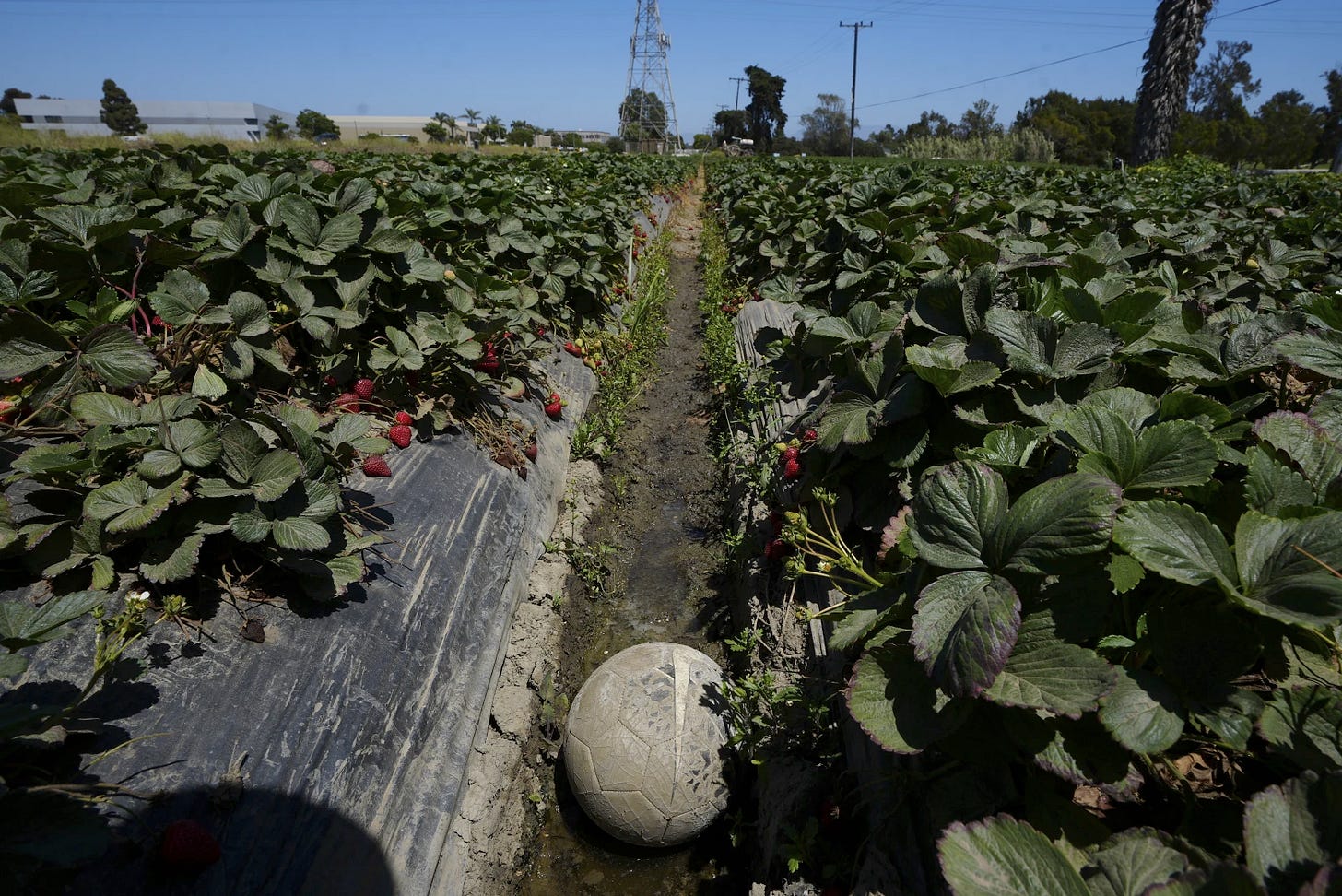Welcome back to The Aggregate Aggregation, our weekly roundup of news and publications that caught our eyes over the last week or so. You can read Volume 12 here.
The headlines once again feel more numerous than weeds… and my garden weeds have been thriving in this rainy summer heat. Conversation about the impact that the Trump Administration’s immigration raids could have on food production in the near future has been buzzing… and, as reporting this week shows, the uncertainty alone is causing slow downs in the field during peak production season.
Meanwhile, we share the results from truly innovative academic research and reporting, work that is critical to advancing US-based agriculture. With funding cuts threatening future research of this kind, we ask: what will be lost? And what creative solutions are available to ensure the necessary work continues?
How can we ensure the continuity of necessary domestic agriculture research? Let us know in the comments!
Surface Level
🇺🇸More federal policy updates (including budget!)
ICE raids return, sparking labor shortages across farms and hotels (NewsNation). Immigration and Customs Enforcement raids are creating a crisis across key industries as enforcement actions target U.S. farms, restaurants and construction sites. Business owners describe the atmosphere in one word: panic. A temporary pause on worksite immigration raids has ended, and ICE is once again operating at full force.
ICE raids and their uncertainty scare off workers and baffle businesses (AP). The horror stories were conveyed to Trump, members of his administration and lawmakers in Congress by business advocacy and immigration reform groups like Shi’s coalition. Last Thursday, the president posted on his Truth Social platform that “Our great Farmers and people in the Hotel and Leisure business have been stating that our very aggressive policy on immigration is taking very good, long time workers away from them, with those jobs being almost impossible to replace.”
Trump 'looking at' immigration relief for farm workers after resuming ICE raids on them (USA Today). President Donald Trump again is saying he wants to shield farmers from the effects of his crackdown on illegal immigration, just days after his administration reinstated workplace raids on agricultural operations.
Department of Labor Suspends Protections for H-2A Guest Workers and Announces Plan to Bring in More (Civil Eats).
🚜On farm research
Tractors for the People (Ambrook Research - which is now Offrange). Very few farms in Africa are mechanized, but a handful of ag-tech startups are trying to get tractors to the masses.
How Do Microclimates Impact Blooms and Bees? (Morning Ag Clips). Climate can vary across large areas of land, but it also can vary within much smaller areas such as farms. A new study by researchers at Penn State examined whether these microclimates — the climate of a very small or restricted area — affect pollination by both wild and managed bees and resulting wild blueberry yields. The study — available online now and scheduled to publish in the October issue of the journal Agriculture, Ecosystems & Environment — took place on a 170 acre wild blueberry field in Maine. Researchers discovered that both wild bees and honey bees found the most densely blooming areas of the fields and concentrated their foraging in these areas. Wild bees also tended to forage on plots that were warmer than average.
Tiny Fertilizer, Big Impact: Nanoparticles Show Promise (Morning Ag Clips). Phosphorus (P) is a critical nutrient for plant growth, but conventional fertilizers often suffer from inefficiencies and environmental drawbacks. This study introduces a nanosized iron phosphate (FePO₄) fertilizer (FePNF) that demonstrates equivalent efficacy to the widely used triple superphosphate (TSP) in supporting cucumber growth under phosphorus-deficient conditions. Despite lower soil P availability, plants treated with FePNF achieved comparable biomass, root development, and chlorophyll levels as those fertilized with TSP. The nanofertilizer also induced distinct changes in soil enzyme activity and microbial community structure, indicating its unique mode of action. These findings point to FePNF as a promising sustainable alternative for phosphorus fertilization in agriculture.
👀More content that caught our eyes
Greenhouses Are Having a Moment (Ambrook Research - which is now Offrange). Long scorned by ag-tech investors, the once-simple structure is taking over indoor growing.
Are We Really Losing Roundup? (Ambrook Research - which is now Offrange). Chemical giant Bayer says it might stop making glyphosate. Offrange readers weigh in on what this announcement actually means for U.S. agriculture.
USDA Cancels Additional Grants Funding Land Access and Training for Young Farmers (Civil Eats). The USDA did not respond to a request for full details on the terminated grants. However, Civil Eats’ reporting has found that one grant cited in the announcement was most likely a $2.5 million award to the nonprofit Agroecology Commons through the Land, Capital, and Market Access Program.
⏰News we caught from a few weeks ago…
Emergency reserves, high prices, rationing. How did Japan’s rice crisis get this far? (AP).
Farming with Less Water (Ambrook Research - which is now Offrange).
How Inflation is Reshaping Farm Finance Strategy (Morning Ag Clips).
Gaza’s Agriculture Continues to Deteriorate at Alarming Rate (Morning Ag Clips).
What did we miss? Drop a link to your favorite story of the week (or month, or year) in the comments. Tell us why it resonated with you!
What we’re reading
A list of sources the editors at The Aggregate check regularly for our agroecology+ news.




Alex - Penn State researchers are ALSO doing research about pollinators and wild blueberries! But you probably knew that.
Kyle - great news roundup. Pun intended. I was excited by the "are we really losing RoundUp" headline, but the knock-off brands make that less exciting.
Here's a headline that made me smile this morning - "A new pan-African movement, KILIMO EKOLOJIA – “Young people in agroecology” in Swahili – is emerging". The article is in French, but the essense is that this group is coming together across quite a few countries to act for climate and food justice. Pretty cool! https://www.espaceafrique.info/alimentation-crise-climatique-naissance-du-mouvement-kilimo-ekolojia-une-reponse-panafricaine-pour-une-agroecologie-paysanne/